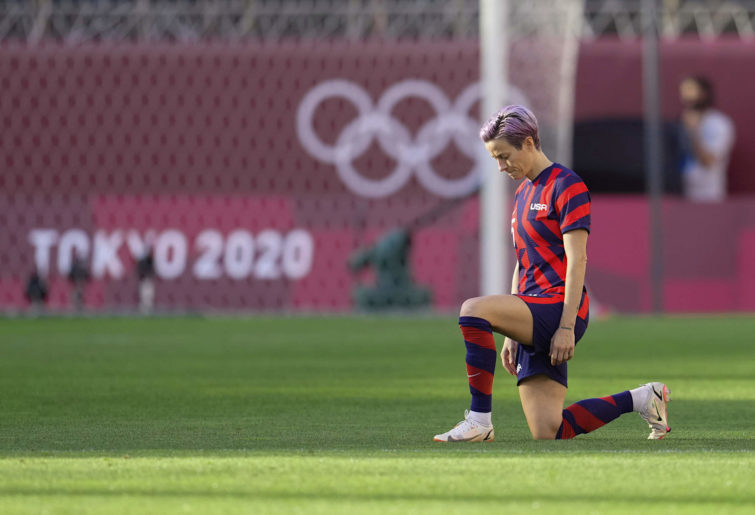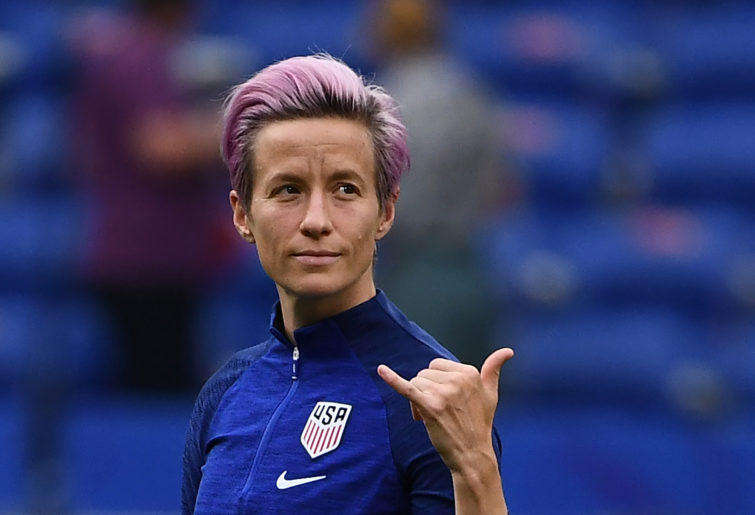American soccer star Megan Rapinoe has announced that this year’s World Cup will be her last. She plans to retire at the end of the season – at 38 years old, she considers it time.
Rapinoe is most recognisable by her short hair, dyed a variety of colours over the span of her career – most famously pink for the 2019 World Cup and this year blue for the 2023 edition.
She is famous, however, for more than just her hair. Her skill on the pitch and her voice off it have contributed to her only-in-America metamorphosis from athlete to celebrity.
Her contribution to soccer and the world beyond it can best be summarised by three legacies she leaves in her wake.
Making American soccer great again (or…for the first time)
Rapinoe started playing competitive soccer when she was only a child, displaying aptitude and a love for the game from as early as she can remember. Her accolades on the pitch include winning gold at the Olympic Games in 2012 and becoming a two-time FIFA World Champion – the US women’s team won the title in 2015 and again in 2019.
An offensive player known as much for her goal scoring as her goal assists, she was deservingly awarded the Golden Boot in 2019.
Rapinoe has an ineffable ability to perform under pressure and to show up for the biggest moments of a match. She plays with a flair and finesse that has made soccer watchable to Americans – even to Donald Trump, who has goaded the team over Twitter but has had eyes on them nonetheless.
One of Rapinoe’s most famous “big moments” came during one of the early rounds of the 2015 World Cup when the US played against Brazil. The US team was down 2-1 and one player short due to a red card.
In her 2020 memoir One Life, Rapinoe writes of the game: “In the 122nd minute, I was thinking, we’re fucked. We’re in the dying minutes of the game, the ball is way down on our end, and the Brazilians are trying to run down the clock with their antics.
“And I’m like, ‘Just fucking pass the ball to me!’ Because I’m open and coming up on the left! And she (Carli Lloyd) dribbles across the field, finally plays it; I take one touch, and I don’t even really look up.
“I just bombed it up the field, where the ball found Abby, who headed it in. ‘Oh my god!’ she screamed. ‘Best cross of your life!'”
This moment – Rapinoe crossing the ball to Abby and her subsequent header straight into the goal – is what soccer is all about. The beauty, the finesse, the blind hope and the singular impact of one goal. The whistle blew just after the ball went in and at 2-2, the game then went to penalty shoot-out and was won by the US, who would go on to win the entire tournament.
The clip of the cross and the header was shown on ESPN, mainstream news and talk shows in America. According to Rapinoe, the global Women’s World Cup audience – which had averaged 13 million viewers per game – jumped to 62 million for the Final. In America, the audience reach increased by almost 200 percent from the previous Cup.
Taking risks, being unafraid to make mistakes, and relentlessly pushing for the win are signatures of Rapinoe’s play style – one that has continued to pay off.
Fighting for the rights of the marginalised
Rapinoe has been famously quoted as saying: “I know what it means to look at the flag and not have it protect all of your liberties.”
In 2016, when NFL player Colin Kaepernick decided to kneel during the American national anthem before the San Fransisco 49ers’ final pre-season game, Rapinoe took this as an invitation to join him. And she did just that – she began kneeling during the American anthem before her own games.
Rapinoe has stated that she had always been the kind of person to stand up to bullies, to speak up when something didn’t feel right and Kaepernick’s silent protest against police brutality in the black community felt no different to this.

(Photo by Brad Smith/ISI Photos/Getty Images)
“After reading everything I could about social and racial injustice,” she writes in One Life, “it became clear to me not only how deep the roots of white supremacy went, but also that it was the system from which all other inequalities came.
“This was a huge light bulb moment: realising that we’re not free until we’re all free; that it wasn’t a question of protesting against racial injustice as if it were my own cause, but doing so because this was also my fight.”
Rapinoe had publicly come out as gay in 2012 and has advocated for the LGBTQ community ever since. She has spent a large part of her public life dedicated to what she terms “activism” and “calling out” sexism, racism and homophobia.
The platform she has gained as an athlete and a celebrity has afforded her numerous occasions to speak to a broader audience – and she has consistently used her voice to campaign for those, who may not otherwise be heard.
Equal pay
When asked what one of the highlights of her career has been, Rapinoe has spoken of the moment when FIFA president Gianni Infantino handed the US women’s team the trophy in 2019 and she could hear the crowd chanting “Equal pay!” as blue and gold confetti rained down on them.
Never had a crowd so unanimously and so vocally united to back equality in women’s soccer. The cries had come after the US team and specifically Rapinoe began lobbying internally and externally for better pay.
The disparity between what the women’s team was earning compared to the men’s team eventually culminated in a lawsuit filed by the players – first against FIFA and then against the US Soccer Federation. It became a campaign when Rapinoe decided to do what she does best – speak about it loudly and proudly. And audiences listened.

(Photo by Franck Fife / AFP / Getty Images)
The World Cup prior to that win had also been won by the US and the team had received US$2 million from the total US$15 million pool of prize money. The prize pool for the men’s World Cup in 2018 had been set at US$400 million. Even after FIFA had announced that they would be doubling the women’s prize pool, Rapinoe declared quite correctly that doubling the money would still leave the women’s prize pool US$370 million short of the men’s.
“The men’s World Cup enjoys more revenue and higher viewing figures than the women’s, but not by a margin that justifies the numbers,” she wrote in 2020.
It should also be noted that in America, the national women’s soccer team has had much greater success internationally than the men’s national soccer team and as such, enjoys greater popularity. For the 2015 Women’s World Cup, a record 25 million people in the US watched the Final.
By comparison, only 14 million people watched the men’s World Cup final in 2018 (when France played against Croatia). To date, that women’s final still counts among the most-watched soccer games ever broadcast in North America.
Last year’s FIFA World Cup in Qatar had a total prize pool of US$440 million and the winning team took home US$42 million. The prize pool for this year’s Women’s World Cup will total US$110 million and the winning team will be awarded US$4.29 million. While the prize pool is not yet equal, it is the highest it has ever been.
After Rapinoe – together with team mates Carli Lloyd, Hope Solo, Alex Morgan and Becky Sauerbrunn – filed a lawsuit against the US Soccer Federation, an agreement was finally made last year: the women’s team was to receive US$22 million in back pay and the women’s and men’s teams would finally be paid equally.
Of all her wins, that one will likely go down as Rapinoe’s most historic.






























































































